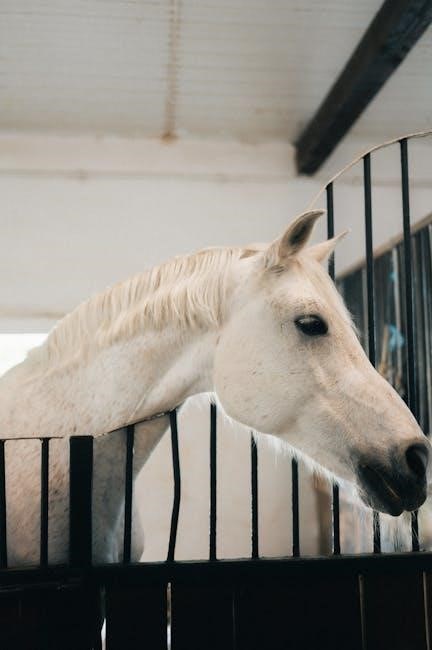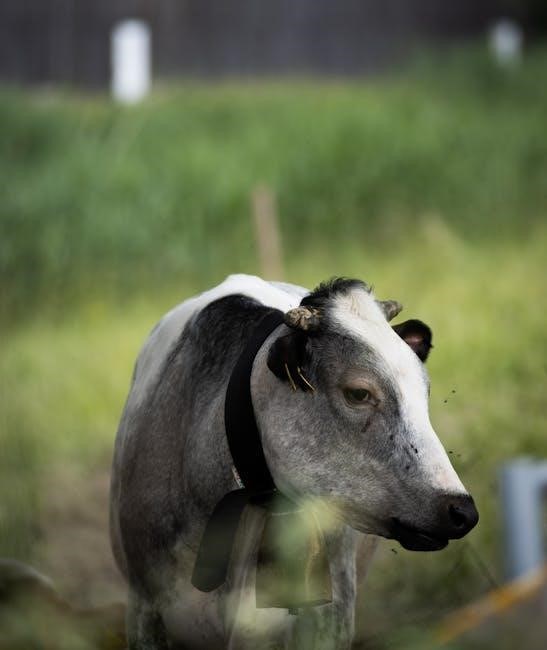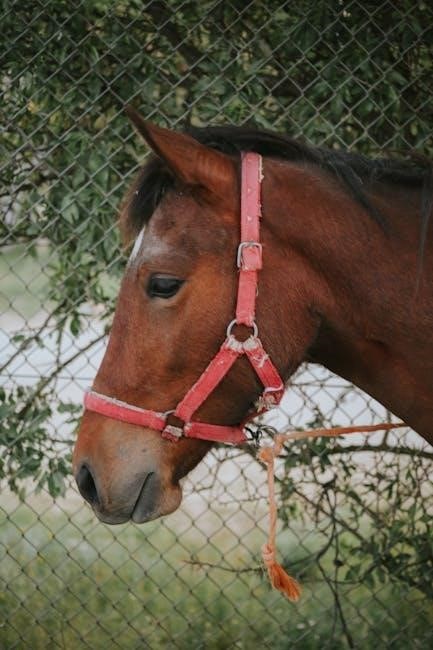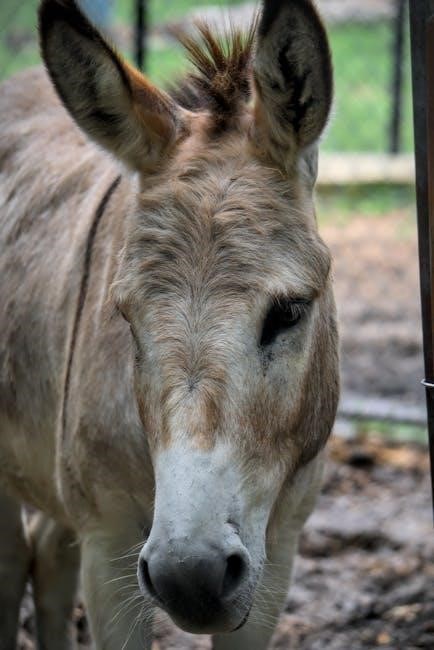Title: Animal Farm Summary PDF
Animal Farm Summary PDF provides a concise overview of George Orwell’s classic novella‚ detailing key events‚ themes‚ and character analyses for easy understanding and reference.
Animal Farm‚ an allegorical novella by George Orwell‚ reflects the Russian Revolution and serves as a cautionary tale about totalitarianism‚ offering timeless lessons on power and corruption.
2.1. Background and Context of the Novel
Animal Farm‚ written by George Orwell‚ was first published in 1945. The novella is an allegory of the Russian Revolution‚ reflecting the rise and fall of Soviet communism. Orwell crafted the story to critique totalitarianism‚ using farm animals to represent historical figures and events. The novel’s context is deeply rooted in the political turmoil of the early 20th century‚ offering a timeless commentary on power‚ corruption‚ and the erosion of ideals. Its simple yet profound narrative has made it a cornerstone of literary and political discourse‚ resonating with readers worldwide.

2.2. Importance of the Summary PDF
The Animal Farm Summary PDF serves as a valuable resource for students‚ educators‚ and readers seeking a clear‚ concise understanding of Orwell’s novella. It condenses the plot‚ themes‚ and character analyses into an easily accessible format‚ perfect for quick reference or study. The PDF highlights key symbols‚ such as the barn and the pigs‚ and their historical parallels to the Russian Revolution. This tool aids in grasping Orwell’s critique of totalitarianism‚ making the novel’s complex themes more approachable. Its availability for download ensures that insights into this timeless classic are readily accessible to a global audience.
2.3. Key Themes and Symbols in the Novel
Animal Farm explores themes of power corruption‚ equality‚ and betrayal through symbolic elements. The barn represents collective unity‚ while the pigs symbolize the rise of a new elite. The novel critiques totalitarianism‚ reflecting Orwell’s concerns about political manipulation. The character of Boxer embodies loyalty and exploitation‚ while Napoleon symbolizes power abuse. The Seven Commandments‚ later altered‚ highlight the erosion of ideals. These symbols and themes create a powerful allegory‚ mirroring historical events like the Russian Revolution‚ offering timeless lessons on the dangers of unchecked authority and the loss of democratic principles. This makes the novel a enduring critique of human nature and governance.

Plot Summary of Animal Farm
Animal Farm recountsthe animals’ rebellion against their oppressive owner‚ Mr. Jones; Led by pigs‚ they establish a new order‚ but power struggles and corruption ensue‚ leading to tragic consequences.
3.1. Chapter 1: The Meeting in the Barn
In the first chapter of Animal Farm‚ Old Major‚ a wise boar‚ gathers all animals in the barn to share his vision of a rebellion against Mr. Jones. He emphasizes the need for unity and the pursuit of a better life without human oppression. The animals are inspired‚ and the seeds of revolution are planted. The chapter introduces key characters‚ including Napoleon‚ Snowball‚Boxer‚ and Squealer‚ setting the stage for the events that will unfold.
3.2. Chapter 2: The Rebellion and New Order
In Chapter 2 of Animal Farm‚ the animals rebellion succeeds‚ expelling Mr. Jones and renaming the farm. The pigs‚ led by Napoleon and Snowball‚ create a set of commandments. The animals work together‚ feeling hopeful. This chapter shows the pigs’ leadership and the start of a new order‚ emphasizing equality and collective effort. The pigs’ leadership and the commandments set the stage for future events‚ highlighting themes of power and unity with the pigs in charge‚ laying the groundwork for the story’s progression.
3.3. Chapter 3: The Rise of Napoleon
In Chapter 3 of Animal Farm‚ Napoleon’s leadership solidifies as he begins to centralize power. The pigs take responsibility for decision-making‚ asserting their authority over the other animals. Napoleon starts to eliminate opposition‚ including driving Snowball off the farm. This chapter highlights Napoleon’s Machiavellian tactics‚ showcasing how he manipulates situations to maintain control. The pigs justify their actions by claiming they are working for the common good‚ while the other animals remain unaware of the growing power imbalance. This sets the stage for the corruption and abuse of power that follows.
3.4. Chapter 4: The Battle of the Cowshed
Chapter 4 recounts the Battle of the Cowshed‚ where the animals successfully defend their farm against a violent attack by neighboring farmers. The animals unite‚ showcasing their strength and determination‚ with Boxer playing a heroic role. The victory boosts morale‚ reinforcing the animals’ belief in their rebellion. However‚ the chapter also subtly hints at the beginning of Napoleon’s manipulation‚ as he starts to consolidate power by rewriting history and glorifying his own role in the battle. This event marks a turning point‚ highlighting both unity and the seeds of future corruption. The animals’ camaraderie is tested‚ setting the stage for power struggles ahead.
3.5. Chapter 5: The Corruption of Power
Chapter 5 explores the deepening corruption among the pigs‚ particularly Napoleon‚ as they abuse their authority. The pigs justify trading with neighboring farms‚ claiming it benefits the farm‚ while they secretly profit. Moral principles erode as the pigs alter the Seven Commandments to justify their actions. Boxer‚ the loyal horse‚ suffers a tragic fate when his body gives out‚ and the pigs exploit his dedication for their gain. This chapter highlights how power corrupts even those who once championed equality‚ leading to the erosion of the farm’s original ideals and the rise of a new tyranny. The animals’ unity begins to fracture under Napoleon’s rule.
3.6. Chapter 6: The Final Downfall
Chapter 6 marks the devastating collapse of Animal Farm’s rebellion. Napoleon’s regime becomes indistinguishable from the humans they initially rebelled against. The pigs‚ now fully corrupted‚ engage in excessive drinking and exploitation. The animals‚ exhausted and disillusioned‚ witness the destruction of their hard work. Boxer’s death and the sale of his body for whiskey symbolize the betrayal of their ideals. The novel concludes with the pigs playing cards with neighboring farmers‚ solidifying their transformation into the very oppressors they once despised. The final scene underscores the cyclical nature of oppression and the loss of hope for a truly equal society‚ leaving the animals in a state of despair and defeat.

Main Characters in Animal Farm
Napoleon‚ Snowball‚ Boxer‚ and Squealer are central figures in Animal Farm‚ each representing distinct roles and themes that drive the narrative and its moral lessons forward effectively.
4.1. Napoleon: The Power-Hungry Leader
Napoleon‚ a cunning and manipulative pig‚ rises to power after the rebellion‚ exploiting his intelligence and charm to control the farm. He gradually consolidates authority‚ eliminating rivals like Snowball and altering the Seven Commandments to justify his actions. Napoleon’s leadership becomes authoritarian‚ prioritizing his own interests over the collective good. His ability to manipulate others‚ combined with his ruthless tactics‚ transforms him into a symbol of corruption and the dangers of unchecked power‚ mirroring totalitarian leaders in history. His reign marks a dark turn in the farm’s journey toward equality and freedom.
4.2. Snowball: The Idealistic Rebel
Snowball‚ a charismatic and intelligent pig‚ emerges as a key leader in the early stages of the rebellion. He is passionate about creating a fair society and devises the Seven Commandments to guide the animals. Snowball’s vision for the farm is rooted in equality and justice‚ making him a beloved figure among the animals. However‚ his idealism clashes with Napoleon’s power-hungry nature‚ leading to his expulsion from the farm. Despite his absence‚ Snowball remains a symbol of the rebellion’s original ideals and the hope for a better future‚ contrasting sharply with Napoleon’s corrupt rule.
4.3. Boxer: The Loyal and Hardworking Horse
Boxer‚ a strong and dedicated horse‚ is the embodiment of loyalty and hard work on Animal Farm. He toils tirelessly‚ often putting the needs of others before his own‚ and becomes a symbol of the farm’s productivity. Boxer’s unwavering commitment earns him the respect of all animals‚ and his motto‚ “I will work harder‚” reflects his unshakeable dedication. Despite his physical exhaustion and eventual decline in health‚ Boxer remains faithful to the farm’s ideals‚ exemplifying the spirit of selflessness and devotion that initially drives the rebellion. His story underscores the themes of sacrifice and exploitation.
4.4. Squealer: The Manipulative Propagandist
Squealer‚ a clever and persuasive pig‚ serves as Napoleon’s propagandist‚ manipulating information to maintain the pigs’ control over Animal Farm. Using his intelligence and rhetorical skills‚ Squealer distorts the truth and rewrites history to justify Napoleon’s decisions‚ ensuring the other animals remain compliant. His ability to confuse and convince makes him a key figure in the corruption of the farm’s ideals. Squealer’s role highlights the dangers of propaganda and the manipulation of truth‚ ultimately contributing to the novel’s exploration of power and control. His actions are crucial to the pigs’ consolidation of authority.

Themes and Symbolism
Animal Farm explores themes of power corruption‚ equality‚ and totalitarianism through symbols like the pigs‚ the barn‚ and the Seven Commandments‚ reflecting Orwell’s critique of authoritarian regimes.
5.1. The Allegory of the Russian Revolution
Animal Farm serves as a vivid allegory for the Russian Revolution‚ with characters and events mirroring historical figures and occurrences. Napoleon represents Stalin‚ while Snowball embodies Trotsky‚ highlighting the power struggle and ideological conflicts. The rebellion led by the animals parallels the 1917 revolution‚ and the pigs’ gradual corruption reflects the Soviet regime’s descent into totalitarianism. Orwell critiques how revolutionary ideals are distorted by power‚ as seen in the pigs’ manipulation of the Seven Commandments. The novel underscores the dangers of authoritarianism and the exploitation of the working class‚ offering a timeless cautionary tale about the betrayal of revolutionary principles.
5.2. The Corruption of Power
The Corruption of Power is a central theme in Animal Farm‚ as the pigs gradually abuse their authority. Initially united for equality‚ they exploit their leadership‚ manipulating rules for personal gain. Napoleon’s rise to dictatorship mirrors the dangers of unchecked power‚ as he eliminates rivals like Snowball and tightens control over the farm. The pigs justify their corruption by rewriting the Seven Commandments‚ symbolizing how power corrupts even those who initially championed fairness. This theme highlights how authority‚ without accountability‚ leads to oppression and betrayal of original ideals.
5.3. The Importance of Equality
The Importance of Equality is a foundational theme in Animal Farm‚ introduced through Old Major’s vision of a fair society. The Seven Commandments‚ particularly “All Animals Are Equal‚” symbolize the animals’ shared goal of unity and justice. However‚ as the pigs manipulate these principles‚ equality erodes. The pigs justify their growing privileges‚ creating a hierarchy that mirrors the oppressive system they initially rebelled against. Orwell critiques how ideals of equality can be distorted by those in power‚ leading to inequality and exploitation. The novel underscores the fragility of equality when power and greed prevail.

Historical Context and Relevance
Orwell’s Animal Farm reflects the Russian Revolution‚ with Napoleon mirroring Stalin’s rise to power. The novel critiques totalitarianism‚ offering timeless insights into power‚ corruption‚ and societal control.
6.1. The Novel as a Reflection of the Russian Revolution
George Orwell’s Animal Farm serves as a powerful allegory for the Russian Revolution‚ with characters and events mirroring historical figures and occurrences. Old Major represents Vladimir Lenin‚ whose revolutionary ideas inspire the animals to rebel. The pigs‚ led by Napoleon and Snowball‚ symbolize the Bolsheviks‚ with Napoleon embodying Joseph Stalin’s authoritarian rise to power. The Rebellion itself reflects the October Revolution‚ while the subsequent corruption and power struggles parallel the Soviet Union’s decline under Stalin. Orwell’s narrative critiques totalitarianism‚ illustrating how ideals of equality and freedom can be distorted by those in power.
6.2. Orwell’s Warning About Totalitarianism
Through Animal Farm‚ Orwell delivers a stark warning about the dangers of totalitarianism‚ illustrating how power corrupts even those with noble intentions. The pigs‚ initially united for equality‚ gradually abuse their authority‚ mirroring totalitarian regimes. Napoleon’s rule embodies the oppressive nature of such systems‚ where dissent is crushed‚ and truth is distorted. The manipulation of the Seven Commandments and the exploitation of the animals highlight Orwell’s critique of how totalitarian leaders maintain control through propaganda and fear. The novella serves as a timeless cautionary tale‚ urging vigilance against the erosion of freedom and the rise of authoritarianism.
Animal Farm Summary PDF underscores Orwell’s timeless critique of power and corruption‚ offering a poignant reminder of the dangers of unchecked authority and the loss of freedom;
7.1. The Timeless Message of Animal Farm
Animal Farm delivers a timeless message about the dangers of corruption‚ abuse of power‚ and the erosion of equality. Orwell’s allegory remains relevant‚ warning against totalitarianism and manipulation. The novella highlights how ideals can be distorted and how power often corrupts even the noblest intentions. Its themes resonate across generations‚ offering insights into human nature and societal structures. The story encourages readers to question authority and cherish freedom. The enduring relevance of Animal Farm lies in its ability to provoke reflection on justice‚ equality‚ and the consequences of unchecked ambition in any society.
7.2. The Impact of the Novel on Modern Society
Animal Farm continues to resonate in modern society‚ offering insights into political manipulation and the dangers of authoritarianism. Its themes of power corruption and loss of equality remain relevant‚ influencing political discourse and education. The novella serves as a cautionary tale‚ urging critical thinking about propaganda and control. By exploring these universal issues‚ Orwell’s work fosters awareness and encourages resistance against oppression. Its timeless lessons make it a valuable resource for understanding historical and contemporary societal challenges‚ ensuring its enduring influence on literature‚ politics‚ and culture.
Resources for Further Reading
Animal Farm Summary PDF is available for free download‚ along with audiobook versions and detailed analysis links‚ providing comprehensive access to the novel’s themes and insights.
8.1. Downloading the Animal Farm Summary PDF
The Animal Farm Summary PDF is easily accessible online‚ offering a free download option. This document includes a concise plot overview‚ character analyses‚ and theme discussions‚ making it an ideal resource for students and enthusiasts. The PDF is available in multiple formats‚ including Word Doc and Text File‚ ensuring compatibility with various devices. Additionally‚ it provides insights into the novel’s historical context‚ enhancing understanding of Orwell’s allegorical masterpiece. This resource is a valuable tool for anyone seeking a deeper appreciation of Animal Farm.
8.2. Recommended Audiobook and Analysis Links
Enhance your understanding of Animal Farm with recommended audiobook versions‚ offering a immersive way to experience Orwell’s timeless narrative. Popular platforms provide free or paid options‚ ensuring accessibility for all. Additionally‚ analysis links offer deeper insights into themes‚ characters‚ and historical context. These resources complement the Animal Farm Summary PDF‚ providing a well-rounded exploration of the novel. Audiobooks and analyses are perfect for students‚ teachers‚ or enthusiasts seeking to delve further into Orwell’s allegorical masterpiece and its enduring relevance in modern society.

Leave a Reply